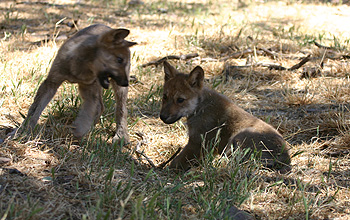|

Press Release 07-149
California Wolf Center Takes Wolves Into Classrooms During National Awareness Week

October 19, 2007
To celebrate National Wolf Awareness Week, the California Wolf Center, located in rural San Diego County, approximately four miles from Julian, is bringing its wolves to classrooms throughout the world. The National Science Foundation (NSF) funds HPWREN, an interdisciplinary and multi-institutional University of California, San Diego, research and education program in order to assess the feasibility of wireless data networking technologies. Its connectivity is now used for a variety of activities at the California Wolf Center ranging from motion sensing cameras and real-time acoustics sensors to live presentations from the hard-to-reach facility to metropolitan university classrooms. Erin Hunt, caretaker of the 35 wolves living onsite, explains that the HPWREN connectivity assists the Wolf Center in achieving its overall goals, such as carrying out research related to wolf vocalization, feeding behavior and natural pack interaction. "Anyone who has access to the Internet can view our wolves in real-time while they are exhibiting their natural behaviors and that's a great education tool," she says. Cameras and microphones networked through HPWREN are used to study behavior and vocalization of wolves, how they interact with one another, and how best to manage them. Specifically, the real-time monitoring equipment includes two antennae for the wireless access point. These antennae support mobile stations that allow researchers and students to make live presentations from the Wolf Center to remote locations such as university classrooms. A megapixel camera, installed in January 2004, helps to provide additional monitoring capability and is accessible via the California Wolf Center's Web site, http://www.californiawolfcenter.org/. The setup also encompasses an Ethernet hub, which is connected by underground fiber to the HPWREN radio/ The hub connects the camera and serves as an access point for Live Interactive Virtual Explorations (LIVE) activities, which allow for real-time "tours" of the Wolf Center from anywhere in the world. Throughout its 30-year history, the Center traditionally has focused its attention on education, conservation and research, according to center director Kim Miller. This project is an example of applying technology in a new way to enhance the education component . For more information visit, http://hpwren.ucsd.edu/news/20071016/.
-NSF-

Media Contacts
Lisa-Joy Zgorski, NSF (703) 292-8311 lisajoy@nsf.gov
Program Contacts
Erin Hunt, California Wolf Center (760)765-0030 erin@californiawolfcenter.org
Principal Investigators
Kim Bruch, HPWREN 858-336-0053 kbruch@ucsd.edu
Hans-Werner Braun, HPWREN 760-870-4401 hwb@hpwren.ucsd.edu
Related Websites
HPWREN News and Information: http://hpwren.ucsd.edu/news
Real-time Camera: http://hpwren.ucsd.edu/cameras/CWC.html

The National Science Foundation (NSF) is an independent federal agency that
supports fundamental research and education across all fields of science and
engineering, with an annual budget of $6.06 billion. NSF funds reach all 50
states through grants to over 1,900 universities and institutions. Each year,
NSF receives about 45,000 competitive requests for funding, and makes over
11,500 new funding awards. NSF also awards over $400 million in
professional and service contracts yearly.
 Get News Updates by Email Get News Updates by Email
Useful NSF Web Sites:
NSF Home Page: http://www.nsf.gov
NSF News: http://www.nsf.gov/news/
For the News Media: http://www.nsf.gov/news/newsroom.jsp
Science and Engineering Statistics: http://www.nsf.gov/statistics/
Awards Searches: http://www.nsf.gov/awardsearch/
| 


